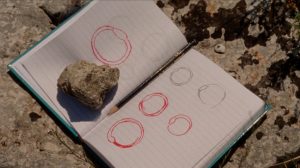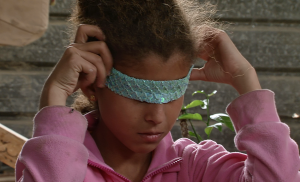Gaza On Screen is a full day of screenings of both recent and historical works featuring the diverse film production from the Gaza Strip during the past seventy years including documentary, fiction and experimental pieces.
Sunday, March 24, 2019
FedEx Global Education Center, Nelson Mandela Auditorium
| Time | Film |
| 10:00am-12:00pm | Selected shorts
Scenes from the Occupation in Gaza 1973. Directed by Mustafa Abu Ali. 11 minutes A work created from a French news report about the Gaza Strip that Abu Ali re-edited, adding additional footage and a new commentary. This is the only film produced by the Palestinian Cinema Group a large collective of filmmakers and artists that came together in 1973 and eventually evolved into the Palestinian Cinema Institute. Voices from Gaza 1989. Directed by Antonia Caccia and Maysoon Pachachi. 51 minutes. Voices from Gaza is the first full-length documentary produced after the start of the first Palestinian intifada. With minimal commentary, it allows the people of Gaza – 70% of whom are refugees – to tell their seldom-heard story. In Voices from Gaza, Palestinian men, women, and children speak frankly about the effect of Israel’s occupation on their lives: curfews have been imposed, arrests are routine, and Israeli army patrols are ever-present. But, they also reveal the work of local “popular committees,” through which they provide each other with alternative education, health care, and welfare services, even under these most daunting conditions. Daggit Gaza 2009. Directed by Hadeel Assali and Iman Saqr. 8 minutes. Politics, food, and family are the topics of a phone conversation between Houston and Gaza that serves as voiceover commentary to the preparation of a spicy tomato salad. Shuja’iyah: Land of the Brave 2014. Directed by Hadeel Assali. 5 minutes. Shuja’iyah: Land of the Brave represents one filmmaker’s personal reflection on the meaning of “crimes against humanity” in the context of Israel’s ‘Operation Protective Edge’ waged in the Gaza Strip in 2014, using footage of her family filmed in the summer of 2013 juxtaposed against audio from the summer of 2014. Assali posed the question, when we say ‘crimes against humanity’, what ‘humanity’ are we talking about?” We Will Return 2018. By Ibrahim Ghunayim, Samir al-Burnu, Sami Shahadah, Arkan Gharib, and Faris Abd al-Malik. 2 minutes. A music video by rapper Ibrahim Ghunayim shot at the Great March of Return. Ghunayim has dedicated the song and video to the journalist Yaser Murtaja who was shot and killed by Israeli security forces while reporting on the March in April 2018. Q&A with Nadia Yaqub, Dept. of Asian Studies, UNC-Chapel Hill |
| 12:00-1:00pm | Break |
| 1:00-3:00pm |  Ouroboros Ouroboros
2017 Directed by Basma Alsharif. 77 min. Ouroboros is acclaimed visual artist Basma Alsharif’s first feature film. This experimental film is an homage to the Gaza Strip and to the possibility of hope based on the eternal return. The film follows a man through five different landscapes, upending mass-mediated representation of trauma. A journey outside of time, marking the end as the beginning, exploring the subject of the eternal return and how we move forward when all is lost. Q&A with Francesca Talenti, Dept. of Communication, UNC-Chapel Hill (Emerita) |
| 3:00-3:30pm | Break |
| 3:30-5:30pm |  Degradé Degradé
2015 Directed by Ahmad Abou Nasser and Mohammed Abou Nasser. Gaza Strip, nowadays. Christine’s beauty salon is heaving with female clients: a bitter divorcée, a religious woman, a lunatic addicted to prescription drugs and a young bride-to-be among others. But their day of leisure is disrupted when gunfire breaks out across the street. A gangland family has stolen the lion from Gaza’s zoo, and Hamas has decided it’s time to settle old scores. Stuck in the salon, the women start to unravel… Q&A with Frances Hasso, Program in Gender, Sexuality, and Women’s Studies, Duke University |
| 5:30-6:30pm | Break |
| 6:30-9:00pm |  Samouni Road Samouni Road
2018 Directed by Stefano Savona. 128 min. In the rural outskirts of Gaza City a small community of farmers, the Samouni extended family, is about to celebrate a wedding. It’s going to be the first celebration since the latest war. Amal, Fuad, their brothers and cousins have lost their parents, their houses and their olive trees. The neighborhood where they live is being rebuilt. As they replant trees and plow fields, they face their most difficult task: piecing together their own memory. Through these young survivors’ recollections, Samouni Road conveys a deep, multifaceted portrait of a family before, during and after the tragic event that changed its life forever. Winner of the L’Œil d’or prize for best documentary at the 2018 Cannes Film Festival. Q&A with Yaron Shemer, Dept. of Asian Studies, UNC-Chapel Hill |
Gaza on Screen is sponsored by the Department of Asian Studies, the Center for Middle East and Islamic Studies, the Institute for the Arts and Humanities, and the First Year Seminar Program.